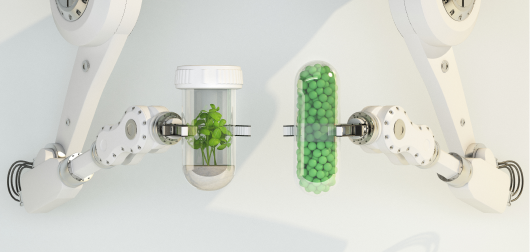Keeping you ahead of the curve with our AI Strategy
Impact of AI in Agriculture and Food Production

Abstract:
Artificial intelligence (AI) is revolutionizing the agriculture and food production sector, presenting numerous opportunities to increase crop yields, reduce labor requirements, and minimize costs, including water usage. This paper explores the wide-ranging impact of AI on various aspects of the agriculture and food production sector, including crop management, supply chain management, and sustainability. By harnessing AI technologies, farmers and food producers can significantly enhance productivity, profitability, and environmental sustainability. However, it is crucial to address ethical considerations such as data privacy, algorithmic bias, and fairness to ensure responsible and equitable AI adoption.
Introduction:
The agriculture and food production sector is experiencing a paradigm shift through the rapid advancements in AI technologies. AI is increasingly being employed to optimize crop yields, streamline labor-intensive processes, and reduce costs, particularly in terms of water usage. This paper provides an in-depth exploration of the diverse applications of AI in the agriculture and food production sector, highlighting the potential benefits, challenges, and ethical considerations associated with the widespread adoption of AI.
Crop Management:
AI plays a vital role in revolutionizing crop management practices, offering a multitude of applications to increase crop yield, reduce labor, and minimize costs, including water usage. By analyzing crucial data such as soil moisture, temperature, nutrient levels, and weather patterns, AI enables farmers to make data-driven decisions for effective crop planning and management. AI-powered tools provide accurate predictions of crop yields, early detection of potential pests and diseases, optimal recommendations for planting times, and precise guidance on irrigation requirements. These applications optimize crop productivity, minimize resource waste, and reduce the environmental impact of farming practices.
Supply Chain Management:
AI contributes significantly to improving supply chain management within the agriculture and food production sector, leading to streamlined operations, reduced costs, and enhanced customer satisfaction. Through the analysis of data on crop yields, weather patterns, transportation, and market demands, AI enables more efficient supply chain planning and management. AI-powered tools assist in predicting supply and demand, optimizing inventory levels, identifying potential bottlenecks, and optimizing transportation routes. These applications enhance the traceability and transparency of the supply chain, ensuring efficient and timely delivery of produce to consumers while minimizing waste and reducing overall costs.
Sustainability:
Promoting sustainability is a critical objective in agriculture and food production, and AI presents a range of applications to achieve this goal. By analyzing data related to water usage, fertilizer application, land management, and weather patterns, AI empowers farmers and producers to make informed decisions that optimize resource utilization and reduce environmental impact. AI-powered tools recommend sustainable practices, identify areas for improvement in resource management, and assess the overall environmental impact of production practices. These applications contribute to more efficient water usage, reduced reliance on chemical inputs, improved land conservation, and lower greenhouse gas emissions, fostering sustainable agricultural practices.
Additional Applications of AI in Agriculture and Food Production:
In addition to crop management, supply chain management, and sustainability, AI finds application in various other areas within the agriculture and food production sector, providing further opportunities to increase crop yield, reduce labor, and minimize costs, including water usage:
Precision Agriculture: AI enables the use of advanced sensors, drones, and satellite imagery to collect real-time data on plant health, soil conditions, and pest infestations. This data facilitates targeted interventions, precise application of fertilizers and pesticides, and proactive management of crop health, ultimately leading to higher yields and reduced reliance on manual labor.
Autonomous Farming: AI-powered robots and autonomous vehicles can perform a range of tasks, including planting, weeding, harvesting, and monitoring crop health. These technologies reduce labor requirements, increase operational efficiency, and enable continuous monitoring of field conditions, leading to improved crop yield and cost savings.
Irrigation Management: AI algorithms analyze data from soil sensors, weather forecasts, and plant water requirements to optimize irrigation scheduling and minimize water waste. By delivering the right amount of water at the right time, AI-enabled irrigation management systems conserve water resources and enhance crop productivity.
Disease and Pest Detection: AI algorithms analyze data from various sources, including satellite imagery, drone surveillance, and sensor networks, to detect and identify diseases and pest infestations at early stages. Early detection enables timely interventions, reducing the spread of diseases and minimizing crop losses.
Crop Breeding and Genetics: AI techniques, such as machine learning and genetic algorithms, aid in accelerating the process of crop breeding and genetic selection. By analyzing vast amounts of genetic and phenotypic data, AI algorithms can identify desirable traits and predict the performance of different crop varieties, leading to the development of high-yielding and disease-resistant crops.
Food Quality Assurance: AI-powered systems can analyze data on food production processes, including temperature, humidity, and storage conditions, to ensure compliance with quality and safety standards. These systems enable early detection of potential issues, reducing food waste and enhancing consumer confidence in the quality of agricultural products.
Conclusion:
The transformative impact of AI in agriculture and food production is indisputable, offering tremendous potential to increase crop yields, reduce labor requirements, and minimize costs, including water usage. By embracing AI-driven solutions responsibly and collaboratively, farmers and food producers can significantly enhance productivity, profitability, and environmental sustainability within the sector. Through the successful integration of AI alongside human expertise, the sector can navigate the challenges and capitalize on the opportunities that lie ahead, forging a more efficient, sustainable, and equitable future.

